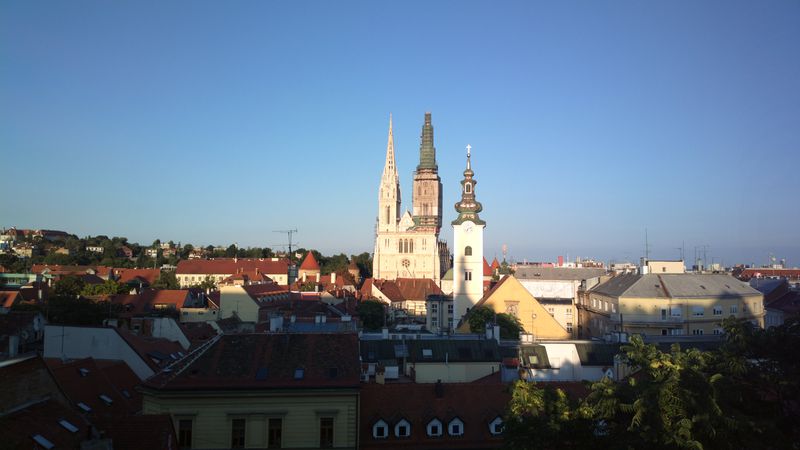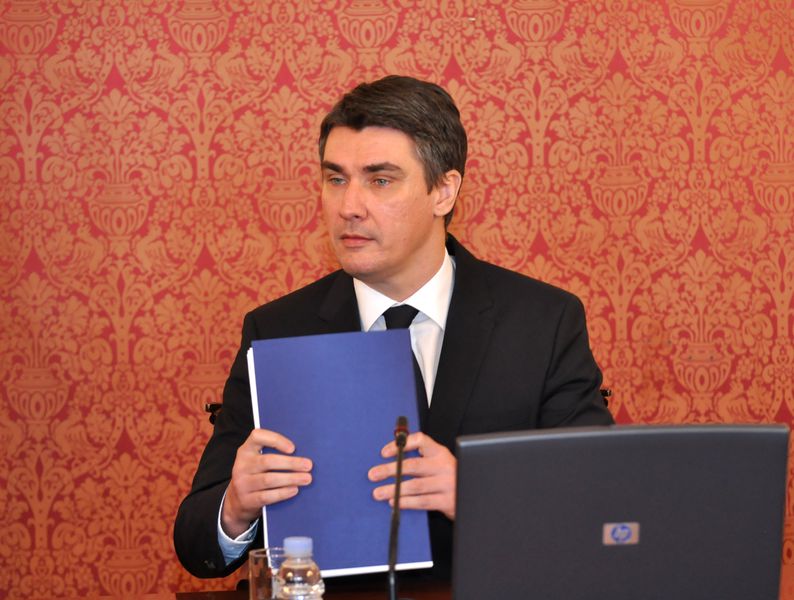Tax Terror or Rule of Law?
Adelina Marini, August 21, 2013
 Closure of restaurants and cafés for 7 kunas (1 euro) surplus in the cash register. Inspections of touristic objects in the peak of the touristic season. Semi-empty market places for fruit and vegetables. A governmental invasion in media. Generally, this is how the past weeks in Croatia can be described. The battle to fill the growing budgetary gap has grown quite large and additionally heated the already hot (politically, but also meteorologically) atmosphere in Zagreb. From the very beginning of his term, Minister of Finance Slavko Linic has been conducting a genuine war to increase the revenues in the treasury, efforts that mark a significant success, but the end of the battle still seems far away. This year, too, the budget is expected to end with a larger gap than expected and, as Linic himself recognised recently, the moment when cutting expenses will no longer be possible is approaching.
Closure of restaurants and cafés for 7 kunas (1 euro) surplus in the cash register. Inspections of touristic objects in the peak of the touristic season. Semi-empty market places for fruit and vegetables. A governmental invasion in media. Generally, this is how the past weeks in Croatia can be described. The battle to fill the growing budgetary gap has grown quite large and additionally heated the already hot (politically, but also meteorologically) atmosphere in Zagreb. From the very beginning of his term, Minister of Finance Slavko Linic has been conducting a genuine war to increase the revenues in the treasury, efforts that mark a significant success, but the end of the battle still seems far away. This year, too, the budget is expected to end with a larger gap than expected and, as Linic himself recognised recently, the moment when cutting expenses will no longer be possible is approaching.
Last year, his ministry created a wall of shame by publishing a list of big debtors who were given a deadline to either pay their dues or renegotiate new terms to pay their taxes to the treasury. This had a huge impact on the country's coffers, but it did not prevent the need of a revision of the budget for 2012. A law was adopted aimed at unfreezing liquidity which also contributed for the rise of political temperatures in Croatia after a commercial judge sent it to the Constitutional Court for an opinion.
Now it is taking-the-cash-out-in-the-light's turn. On August 1st, the law on fiscalisation has entered into force in its entirety through which the state intends to follow the cash flows in the country. The introduction of cash registers with Internet connection to the tax administration started in the beginning of the year, but July 31st was the deadline for the introduction of cash registers everywhere, including open trade spaces, like market-places. Mass inspections across the country began on July 1st, especially along the coast, right in the peak of the season. There were extreme situations when a restaurant in Zadar was closed for 120 kunas surplus found by the tax authorities and recently a café was closed for only 7 kunas surplus in the cash register.
In the mean time Jutarnji list reported recently that a hotel owner on the island of Hvar, in spite of the crisis and the decline of turnovers, after the introduction of a cash register his monthly turnover for the first six months of the year increased by 2729% compared to the same period of last year. Because of such cases, many media announced that the state was conducting a tax repression and there was indignation against the excessively strict application of the rules. Moreover, the question whether it was relevant to close restaurants was put forward, as well as the aggressive tax inspections at the seaside in the epicentre of the touristic season. But from Banski dvori claim that this is the right path because it is important to bring order.
Minister Linic vowed in a series of interviews (otherwise a rarity for him) that there will be no mercy even for a kuna. It is not a shame to close cafés, but it it a shame that there are people who cheat. "It is a shame for Croatian tourism because those are people who steal, fill their pockets in, but I'm telling them that not only are you a shame for the Croatian tourism, but be sure that we will check your properties and we will come to your monies", the minster said in an interview for the Nova TV in the beginning of August a little before he went for his annual vacation.
According to the chief of the revenue agency, Nada Cavlovic Smiljanec, for the first semester of the year, in the sector of hotels and trade, the turnover has increased by 7 billion kunas (circa 1 bn euros) compared to the same period of last year. The expected increase of VAT revenues (25% generally and 10% for tourism) for this year is for a billion and a half kunas more, although the initial forecasts were for 500 million kunas. All this against the backdrop of the visibly weaker touristic season due to Croatia's accession to the EU and the introduction of visas for traditionally big touristic flows from Russia and Ukraine. The coffers had swollen up by another 5 million kunas from fines. Ms Smiljanec said that this was only the beginning and that those who evade will pay higher taxes. And for 20 000 kunas one can go to prison.
One of the targeted groups by the law on fiscalisation are middlemen. The introduction of cash registers at market places caused very sharp reactions and even clashes. At a market place in Zadar a month and a half ago there were severe clashes between traders who had installed cash registers and use them and those who were against. The police had to protect for days those who wanted to be on clear terms with the state, who believes that these measures will only hurt the middlemen who want to benefit on the back of honest producers. Since August 1st, one of Zagreb's touristic landmarks, but actually a functioning market place - Dolac - has been half empty. Traders announced in the end of July that  they will be on a vacation and hinted that they might not return. According to Ms Smiljanec, though, they do not need to return because they were middlemen. It is time to introduce order, she added. According to her, in the end of the day only producers will remain at the market places.
they will be on a vacation and hinted that they might not return. According to Ms Smiljanec, though, they do not need to return because they were middlemen. It is time to introduce order, she added. According to her, in the end of the day only producers will remain at the market places.
Prime Minster Zoran Milanovic was also determined that people should learn what order is. According to him, the closure of restaurants and cafés had purely pedagogical purposes because it conveys a message that the state should not be deceived, the honest taxpayers too. Croatia is not the Wild West, he added after returning fresh from his summer vacation.
The reactions are mostly approving, although there were many voices against the "repression". Why now since until recently everyone worked in one way and now this is changed, there were questions. The revenue agency chief responded to them saying that for that were responsible high officials who were fired. There will be more changes, she added and underscored that it was important to bring order. The business magazine Lider, however, told of many cases of genuine tax terror which raises not only moral but also constitutional questions. For instance, the magazine told of a case when an inspector ordered coffee and when the waiter wanted to issue a check the "guest" would insist that there was no need to. "You better keep the money for yourself. You don't need to give it to Linic", were the inspector's words.
This, the magazine believes, is an incentive for a criminal deed which is not constitutional. There are tens of cases when inspections are quite demonstrative, in the presence of tourists. Recently there was a case when tourists were evicted from a hotel because of unpaid taxes by the owner. The tourists, most of whom foreigners, made reservations long ago and were left out in the street. The most frequent are episodes when inspectors order something and leave so quickly that waiters cannot issue checks. Later they come back directly with the fines. The magazine reports that for the period July 1st - July 29th 2514 inspections were realised which found 559 irregularities. For the same period 90 closures were ordered.
 Nonetheless, Croatia probably is a unique case. The minister of finance is the second most popular man in the country after President Ivo Josipovic. Prime Minister Milanovic, whose rating is constantly declining, seemed a bit jealous on Monday evening during his one-hour long interview in the national TV HRT. He recalled, that the introduction of order and hard work were his words. Even the motto of his cabinet. However, order, not terror, he emphasised.
Nonetheless, Croatia probably is a unique case. The minister of finance is the second most popular man in the country after President Ivo Josipovic. Prime Minister Milanovic, whose rating is constantly declining, seemed a bit jealous on Monday evening during his one-hour long interview in the national TV HRT. He recalled, that the introduction of order and hard work were his words. Even the motto of his cabinet. However, order, not terror, he emphasised.
Manuela Tasler, deputy editor-in-chief of Lider writes that the purpose of fiscalisation is only one - to bring order in finances and payments. "We know that the blocked liquidity in the country is at a level of some 40 billion kunas. We know that tax evasion is a favourite national occupation. We know that grey economy is between 20% and 30% of GDP. We know that non-payment is a key problem in this country. But when finally this problem was started to be sorted out step by step, protection is sought by the Constitutional court, in Strasbourg, in the street, market places and everywhere where a TV camera shows up. Dear people, how do we imagine to solve the problem with the lack of liquidity? How do we imagine that the problem of shadow economy can be solved? How do we want to make it happen the invoice our company issues to be paid within the agreed time frame? With a magic wand?", asks Manuela Tasler.
 Kolinda Grabar-Kitarovic | © KGK
Kolinda Grabar-Kitarovic | © KGK Jozo Rados | © European Parliament
Jozo Rados | © European Parliament Aleksandar Vucic, Andrej Plenkovic | © Vlada RH
Aleksandar Vucic, Andrej Plenkovic | © Vlada RH